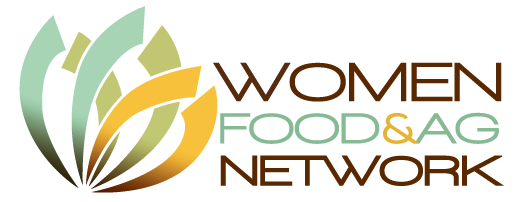Carly McAndrews Gains Experience on Farms Across United States
by Ash Bruxvoort
Carly McAndrews learned about WFAN’s Beginning and Aspiring Learning Circle through her co-worker, Molly Schintler. “The day I met Molly she put me in touch with Wren at WFAN. I was amazed to learn about the large community of female farmers in this area,” she said.
Since her first farm job in 2011, Carly has worked on six farms across the United States, including farms in Connecticut, Vermont, California, and Iowa. She’s currently at Echollective Farm in Mechanicsville, Iowa, alongside Molly. She said she loves the community of people she works with.
Carly decided to attend the learning circle with Molly. She found the experience incredibly empowering. “I met so many women who have already started to farm or want to start a farm,” she said. “I was really impressed by Carmen Black’s [Sundog] Farm. She has such beautiful land and is so successful at a young age. I think it’s harder for women to jump into this business but seeing the women at that learning circle and their businesses made me feel like I could do this, too.”
Her interest in sustainable agriculture began when she was a student at the University of Vermont studying English, film, and environmental studies. Prior to college, she said she didn’t know very much about local food. The summer of her sophomore year she went back home to Connecticut and took a job at a farm in her hometown. From that point forward she was hooked.
Mentorship on Diverse Farms
With several years of farm experience under her belt, Carly has a wide range of skills. This year at Echollective she hopes to learn how to drive a tractor. “It’s hard to break in and get trained on machinery,” she said. “Especially if you’re inexperienced. But Derek, [the owner of Echollective] is willing to train Molly and me this season.”
Every farm is different and the mentorship opportunities at every farm are different. Carly said that while she’s had great male mentors, like Derek, she thinks there is something special about having a female mentor.
“I worked at Blue Heron Farm in Vermont. Christine Bourque-Farris was one of the two head farmers and I mainly worked with her,” she said. “Christine is an incredibly strong woman. Every task we did she did it so fast and perfectly. That season I wanted to be as fast as Christine and by the end of the season and I was. Now I feel very strong and fast.”
She said working a variety of farms has helped her understand what kinds of crops she wants to grow on her future farm. Another great mentor to her was Adam at Adam’s Berry Farm in Vermont. She said the experience helped her decide to include perennial berries on her future farm. She said that while there are advantages to working on the same farm and climbing the ranks, working on a variety of farms in different states has allowed her to see different management styles, network, and connect to a wide range of mentors and friends.
“Having a mentor that will listen to you and answer your questions without being impatient is what I really value,” she said. “I can go to them with a problem without feeling weird or taking up too much time.
Looking Towards the Future
Carly said she’s just beginning to feel like she can run a farm of her own. In the fall she will begin her Masters Degree in Sustainable Agriculture at Iowa State University but hopes to start her own farm in around five years. “Every new farm I work on I want to incorporate something I learn,” she said. “I definitely want to have a lot of perennials, a large vegetable operation, a couple of cows, and maybe some chickens.”
She suggests women who are interested in starting their own farm journey connect with organizations like the National Young Farmers Coalition and WFAN. “Those networks make you feel so empowered and that is so important for women. It’s traditionally been men in these roles. I don’t see myself waiting to find a partner to start an operation and jump in.”
From working on farms, Carly knows that no farmer truly does anything on their own. The learning circle reiterated this point. “None of the women farming could do what they did without their community or mentors.”
WFAN’s program for beginning and aspiring women farmers, Harvesting Our Potential, is made possible by generous support from the Iowa Women’s Foundation and Ag Ventures Alliance.


